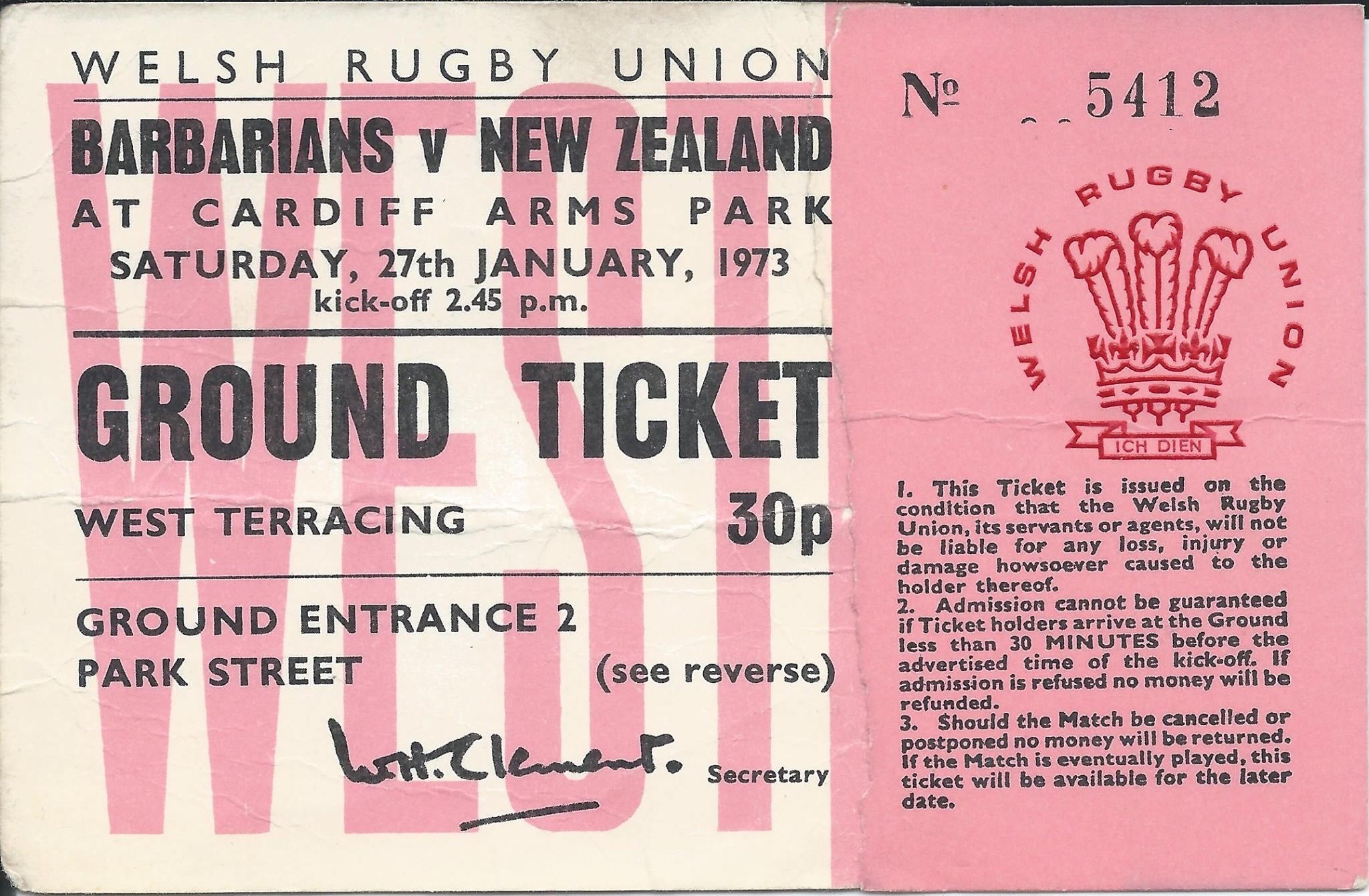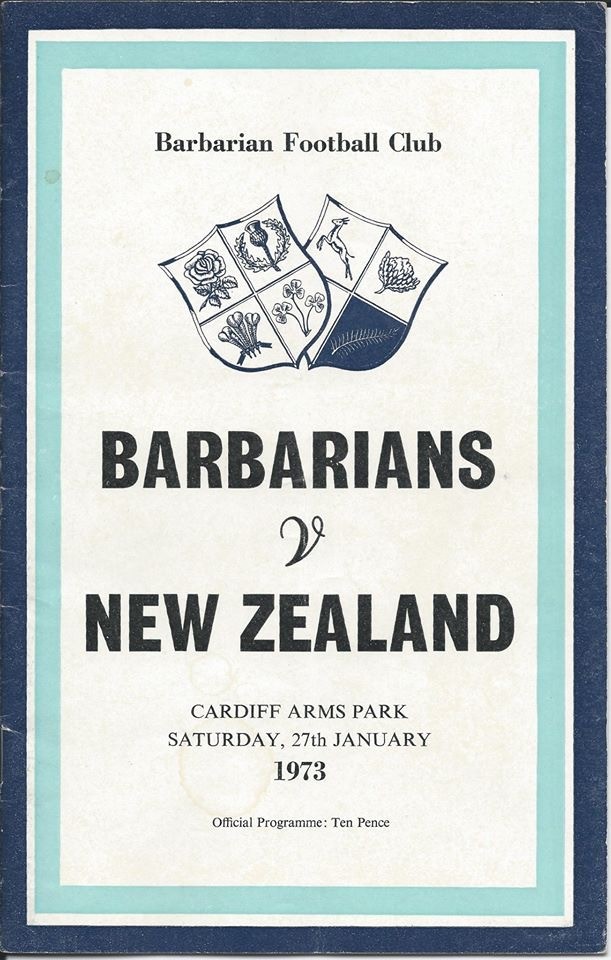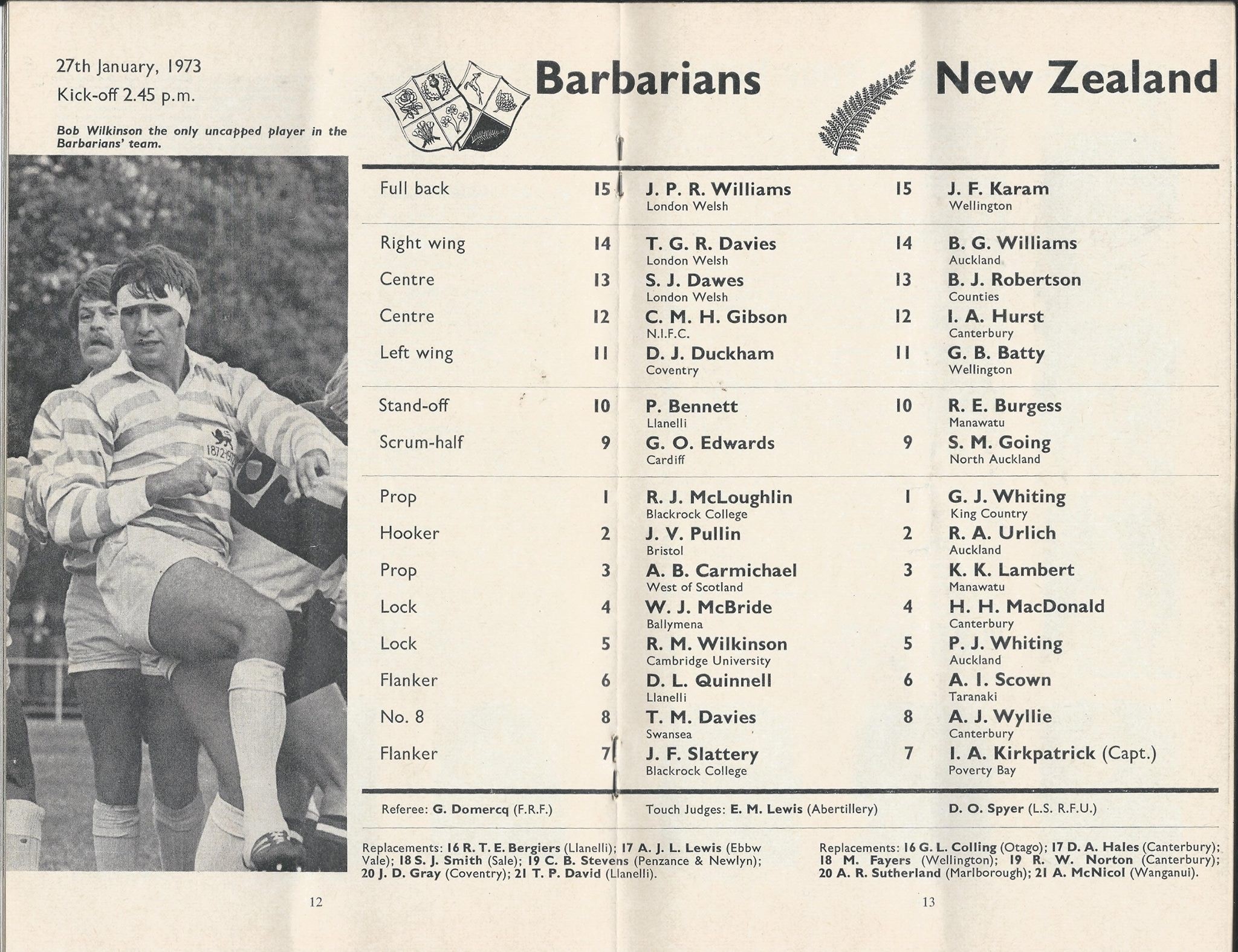CURUFC was deeply saddened to hear the tragic news that Bob Wilkinson died on Monday 1st February aged 69 after a short illness, which was not Covid related.
Bob was born in Luton on 25th July 1951, and was educated at St Albans School. He came up to Cambridge in 1970 and gained three Blues between 1971 and 1973. Oxford were victorious in 1971, but Cambridge triumphed in 1972 and 1973, the start of a run of 5 victories, the first time that this had been achieved by either University, and which Cambridge were to repeat twice more (1980-84 and 1994-98) before the end of the century.
Bob is often best remembered for having the honour (whilst still at Cambridge) of bring the “traditional uncapped” player that the Barbarians always selected, for one of the most celebrated games of all time, against New Zealand in Cardiff in 1973. 12 of the victorious 1971 British Lions were reunited to produce some incredible rugby memories, including the “greatest ever try” by Gareth Edwards. It is perhaps less well remembered that Bob (resplendent in his Cambridge socks) played a crucial part at the very start of that incredible sequence of play – he was unceremoniously barged out of the line-out which the Barbarians lost. In the current era it would have been immediately penalised and that incredible try would never have happened! In an ironic and sad twist of fate, the man who threw the ball in was legendary England and British Lions hooker John Pullin, who also died last week after a long illness.
The ethos of the 1971 Lions left a lasting impression on Bob, who he sighted as the major influence on his Rugby career. “The touring party contained such great talent, organisation, leadership flair, character and determination, that it could not fail to leave a lasting impression on a young player. And it certainly did on me. I would forever be a disciple of the running, passing, try scoring brand of rugby that they played to the very highest level, whilst not forgetting the tough basics of the game”. With such a philosophy it is hardly surprising that Bob played an impressive 19 times for the Baa Baa’s including in the 1977 game versus a British Isles XV, and captained them on the 1979 Easter tour of Wales. He made a swansong appearance against Penarth in 1984.
He also won 6 caps for England in 1975 (touring Australia) and in 1976, when he partnered the legendary Bill Beaumont in the engine room. Such a low number of caps does not seem to do justice to Bob’s prodigious ability and athleticism, but it was the era when “bulk and stodgy solidity” were in vogue, and the selectors decide to turn to the likes of Maurice Colclough.
It seems only natural that being Bedfordshire born, Bob would be a one-club man, and he was a stalwart for Bedford Blues, for whom he made his debut as a 17-year-old schoolboy, and his career with them spanned an impressive 17 years, the last of his 311 appearances being in 1985. He is regarded as one of the very best lineout experts and ball handling lock forwards to play for Bedford, and scored an impressive 37 tries for the club, and he captained them for 3 years (1976-79). His finest hour for Bedford was as a key part of the 1975 John Player Cup winning side, when they defeated Rosslyn Park 28 – 12 on 26th April. Bob played in every game of the campaign, in which Sale, Gosforth and the then mighty Coventry were all defeated at Goldington Road, before facing the might of Rosslyn Park, who were having their best ever season, in front of 18,000 (a then record for the cup) at Twickenham.
Both sides boasted a strong Cambridge connection. As well as Bob, the Bedford scrumhalf was the remarkable Alun Lewis, who became a British Lion as a replacement in 1977, and the late John Howard, who captained Cambridge in the 1972 season was at centre, and they were coached by Pat Briggs, (Blue in 1963 and 64). The Rosslyn Park pack featured the Light Blue legends Phil Keith-Roach as Captain, and the ultimate “Mr Cambridge Rugby” Tony Rodgers in the engine room. Andy Ripley, who graced Grange Road so many times for the Mickey Steele Bodger XV was at No 8. Having initially struggled to hold the strong Park pack, Bedford cut loose, playing the brand of Rugby that Bob loved, and scored 5 tries without reply, the second being started by Bob who claimed a tough high ball – and the move was finished by the Bedford tight head – of which no doubt Bob massively approved!
Bob worked for, and went on to run, his family's import business creating a successful career for himself, focused mainly on the banana trade. He eventually sold the business and stepped back from business life. He continued his involvement with Bedford rugby, and had attended several of the recent events held in connection with the Cambridge 150th Anniversary Red Lion campaign – at which his dry sense of humour and forthright views were much in evidence – especially when in partnership with his fellow team-mate Alun Lewis.
It is fair to say that Bob was not in full agreement with the way that Rugby had developed during the professional era, and he was very happy to debate the subject vigorously – his views were perhaps unsurprising given his own career as a dedicated and loyal one club man at Bedford, and for whom loyalty, comradeship and the traditional values of the game would always be paramount.
The club would like to extend their sympathy and condolences to his wife Sally and their four sons Ben, Jonny, Matthew and Paul at this sad time of their sudden and unexpected loss.
Perhaps the last word on Bob should come from that great game back in 1973, when the immortal Cliff Morgan, commentating in breathless amazement on the Gareth Edwards’ try, produced the following prosaic tribute
“If the greatest writer of the written word would have written that story, no one would have believed it”.
In many ways, Bob’s life and in particular his Rugby career is reflected in these immortal words.
A video of the 'greatest ever try' from the Barbarians v New Zealand game can be seen here.


